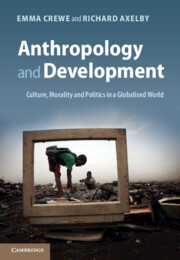Book contents
- Frontmatter
- Contents
- List of acronyms
- Preface and acknowledgements
- 1 Introduction
- 2 Anthropologists engaged
- 3 The social and political organisation of aid and development
- 4 The elusive poor
- 5 Human rights and cultural fantasies
- 6 Hierarchies of knowledge
- 7 The moralities of production and exchange
- 8 The politics of policy and practice
- 9 Imagining the future
- Appendix: challenging questions arising from this book
- Notes
- References
- Index
2 - Anthropologists engaged
Published online by Cambridge University Press: 05 November 2012
- Frontmatter
- Contents
- List of acronyms
- Preface and acknowledgements
- 1 Introduction
- 2 Anthropologists engaged
- 3 The social and political organisation of aid and development
- 4 The elusive poor
- 5 Human rights and cultural fantasies
- 6 Hierarchies of knowledge
- 7 The moralities of production and exchange
- 8 The politics of policy and practice
- 9 Imagining the future
- Appendix: challenging questions arising from this book
- Notes
- References
- Index
Summary
The origins of anthropology pre-date those of development as we know it. Charting the history of engagement, this chapter outlines the opportunities and dilemmas that face anthropologists as they seek to apply their distinctive approach and specialist knowledge to the world of development.
Key points covered by this chapter
This chapter charts anthropology’s evolving relationship with applied work from the nineteenth century to the present.
A historical review of the changing relationship between anthropology and development allows us to understand concerns over engagement and point to some of the ethical challenges manifest in applied work.
Opportunities for the application of anthropological expertise to development work are outlined: anthropologists have provided important contextual knowledge, assessed social impacts of development schemes and advocated for indigenous rights. The limitations of these approaches are also described.
Central to this review is a consideration of the ethical, political and moral considerations that arise when anthropology is applied to development.
In recognising the disciplinary and political compromises that arise from engagement, we consider how such pitfalls might be navigated.
From the discipline’s establishment in the late nineteenth century, anthropology was disinclined to deal with the idea of ‘development’. In part this reluctance stems from the implication that societies can be ordered hierarchically along a line of evolutionary progress. But no man (or culture) is an island and anthropologists have been forced to contemplate the complex processes by which communities are incorporated into wider political and economic systems. The notion that anthropologists should engage in applied work has an equally troubled history. For some, engagement involves an implicit acceptance of particular regimes of change. Other anthropologists have promoted the notion that their understandings could be turned to practical purposes. Over the second half of the twentieth century opportunities for applied work expanded as development grew into a global project. Engaging in development, anthropologists have established a role for themselves as social development advisors capable of injecting a degree of cultural appropriateness into external interventions. Having accepted these positions, anthropologists were left well placed to turn their attention to the institutions, projects and programmes of the development industry itself. Whether writing from inside or outside the development industry, anthropologists have been highly vocal in their critiques of the bureaucratic practices and cultural assumptions through which the world is reshaped.
- Type
- Chapter
- Information
- Anthropology and DevelopmentCulture, Morality and Politics in a Globalised World, pp. 27 - 45Publisher: Cambridge University PressPrint publication year: 2012



